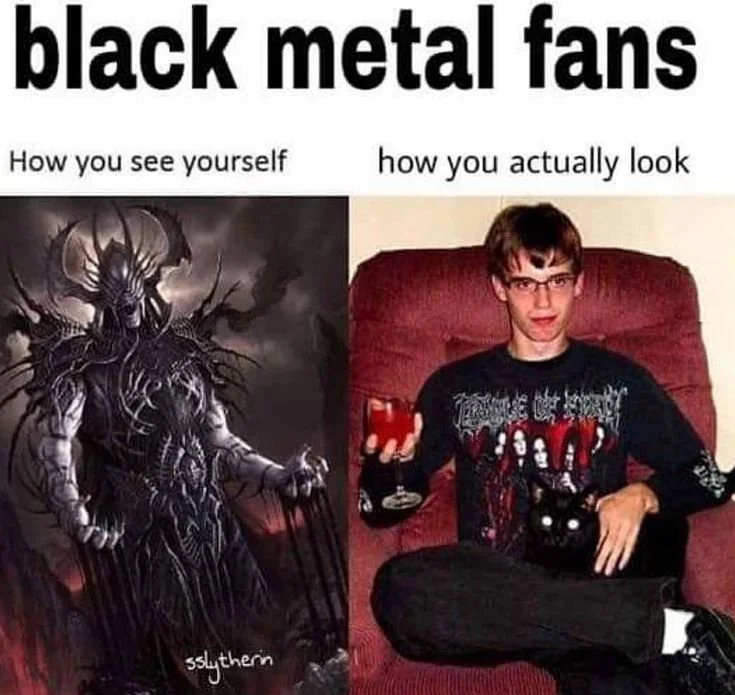ARE YOU A METAL POSER? A Guide to Navigating Metal’s Oldest Debate
Class is in session, dorks! Put down your limited edition vinyl and wipe the corpse paint from your eyes. Today, we're tackling the most ancient and divisive question in all of heavy metal: "Are you a poser?" To be honest if you need to ask, you probably are. But hey, maybe there’s a slime chance you’re not or can become a lifer!
Generally though a metal poser is someone who adopts the look and attitude of the metal subculture without a genuine passion for the music, a proper understanding of its history, or a willingness to engage in the scene beyond its most commercial aspects.
So maybe that’s you, maybe not. Either way, this isn't a witch hunt. It's simply an examination of a timeless debate, meant to inform the newcomers and maybe even give the old guard a reason to lighten up.
So let’s see…ARE YOU A POSER?…
The Old Guard's Battlements: Why Gatekeeping Exists
To understand the poser, you first have to understand the gatekeeper. For many lifers in the metal scene, the term "poser" isn't just an insult, it’s a defense mechanism. The argument is that in a world of passing trends, gatekeeping protects the integrity and authenticity of a subculture that was built on passion, sweat, and a rejection of the mainstream.
For them, a poser is someone who co-opts the aesthetic without understanding the history or the raw, visceral feeling that defines the music. It’s about protecting the sacred ground of the underground.
The New Blood's Argument: Breaking Down the Walls
On the other side of the pit, the argument against gatekeeping is simple: it's elitist and counterproductive. A music scene that refuses new blood is one that eventually dies. Why should anyone be punished for discovering a band on TikTok or wearing a vintage-looking shirt from a mall? Passion has to start somewhere. The new generation argues that judging someone for where they came from or what they look like is the real "un-metal" behavior. The truest form of the genre is an open-armed rebellion against the status quo, not a closed-off, self-important club.
But don’t get it twisted. A metal lifer doesn’t go to every single gig, they don’t need to own ALL the vinyl in the world, or even update their fledgeling metal website constantly…but there are a few things they don’t do that posers might. But before we cover that, let’s look at how this fascinating creature came into existence!
The History of the Poser
The concept of the "poser" is as old as the metal scene itself, a product of a fiercely protective and identity-driven subculture. The term gained prominence in the late 1970s and early 1980s, born from the conflict between the new wave of British heavy metal (NWOBHM) and the burgeoning thrash and speed metal scenes in the US.
In the early days, being a metal fan was a statement of rebellion against the mainstream. The music was an underground phenomenon, and its followers were a tight-knit community. The term "poser" emerged to describe those who were perceived as adopting the look and attitude of the scene without having a genuine love for the music or understanding its history.
It was a way for the die-hards to distinguish themselves from outsiders who were only interested in the commercial appeal of bands like Mötley Crüe or Poison, which were gaining mainstream attention and seen as "glam" or "sell-out" acts by the underground.
The term really took hold with the rise of thrash metal, which was defined by its raw speed and anti-commercial stance. Bands like Metallica and Slayer were seen as the authentic counterpoint to the more accessible, radio-friendly "hair metal" bands of the era. To thrash fans, anyone who wore leather, studs, and bandanas but couldn't name a single song from a band like Venom or Exodus was, by definition, a poser.
The ultimate sin was not knowing the history of the music that inspired the look.
The Evolution of the Poser and Their Crimes
Over the decades, the definition of a poser has evolved, adapting to each new subgenre and the changing face of the music industry. Here are some of the most common archetypes and examples:
The Glam Rock "Poser"
In the 1980s, this was the original poser. They were fans of bands who traded denim and leather for makeup, hairspray, and flashy outfits, focusing more on image than on the raw sound that defined the underground. To many, Poison and Bon Jovi represented a commercial sell-out and a betrayal of metal's heavy, rebellious spirit. They were seen as all flash, no substance.
The "Nu-Metal" Poser
In the late 1990s and early 2000s, the battle lines were redrawn. A new generation of metal fans emerged with a sound that incorporated elements of hip-hop and alternative rock. To traditionalists, bands like Korn and Limp Bizkit were the new posers, tainting the metal genre with trendy, mainstream sounds. The fans, often wearing baggy jeans and backward baseball caps, were seen as having no respect for the thrash and death metal heroes who came before.
The "Mallcore" Poser
This term became popular in the 2000s, targeting fans who discovered bands through Hot Topic and other mainstream retailers. It was a pejorative term for the fusion of metalcore and post-hardcore that became popular with younger audiences. The quintessential "mallcore poser" was a fan of bands like Bring Me the Horizon (in their early days) or Bullet for My Valentine but had no knowledge of their thrash or melodic death metal influences.
The Casual Listener Poser
In the age of streaming, this is perhaps the most common type. They might have a popular band's T-shirt, like Mayhem or Darkthrone, but their knowledge is limited to a handful of songs found on a curated Spotify playlist. They're drawn to the imagery and the legacy but haven't taken the time to dig into the discography or understand the genre's deep roots. While harmless, this behavior still draws the ire of those who have dedicated their lives to the scene.
Ultimately, the poser is a reflection of the eternal conflict between authenticity and commercialism. For some, metal is a lifestyle that demands dedication and knowledge, while for others, it's just great music. The debate itself is as much a part of metal's history as the music.
The Poser's Ten Commandments (According to the Internet)
So, what defines a poser? While we believe that all that truly matters is a love for the music (WHICH MAKES US POSERS BY OUR OWN DEFINITION!), here are the most infamous "unspoken rules" that have fuelled countless forum debates and in-person scoffs.
Thou Shalt Not Know the Classics: You've got the Slayer shirt, but you can’t name a single song from Show No Mercy. You have a Metallica hoodie, but you don’t know which albums Cliff Burton played bass on.
Thou Shalt Only Follow the Fashion: Your interest in black metal began and ended with the aesthetic. You know how to apply corpse paint and wear bullet belts, but the only Celtic Frost you've seen was on a Scottish windsheild in winter.
Thou Shalt Not Enter the Pit: You stand on the sidelines, clinging to your phone, terrified of getting a little beer on your jacket. The pit isn’t a place of violence; it’s a place of communal chaos, and you want no part of it.
Thou Shalt Only Listen to the Radio: Your playlist is made up of the same five songs that get played on every rock station. You haven't dug for a B-side in your life.
Thou Shalt Not Headbang: Headbanging is an involuntary, instinctual reaction to a crushing riff. You prefer a polite, subtle bob of the head (black metal and DSBM are the exception though!).
Thou Shalt Gatekeep Backwards: You call old-school bands "boring" or "outdated," while holding up the new wave as the ultimate truth.
Thou Shalt Say "I Listen to Everything Except Country and Rap": This is the ultimate red flag of not having a single, specific passion.
Thou Shalt Not Know the Lore: You couldn't tell us what a "buzzsaw" tone is or which Florida studio produced all the classics.
Thou Shalt Judge Subgenres: You believe one subgenre is superior and mock others without understanding their history or musical merit.
Thou Shalt Not Support the Underground: You only listen to the biggest bands, never buy merch from smaller bands, and only go to stadium shows.
The Only Rule That Matters
Ultimately, the truth is, everyone's journey into metal is different. Some of us found it on the radio, some through a friend, and some through a TikTok video. What matters isn’t how you got here, but that you stayed. So, whether you're a lifer with a closet full of patched jackets or a newcomer with a brand new shirt, remember this: the only true "poser" is someone who fakes their love for the music.
If your heart pounds to the blast beats and your soul thrives on the riffs, then you belong. Now turn it up and bang your head, ya slags!






